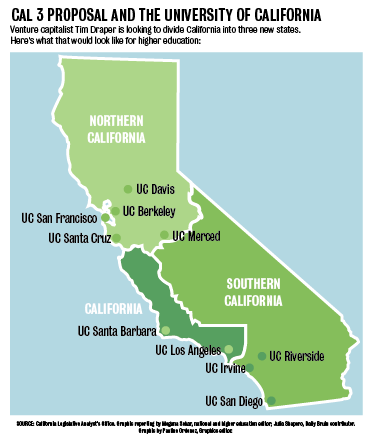Proposition to split California could affect UC tuition, organization


By Julia Shapero
July 16, 2018 12:40 a.m.
A proposition to split California into three separate states could affect students in the University of California system.
The initiative, also known as Proposition 9, will be included in the November 2018 statewide ballot and is funded by venture capitalist Tim Draper. The proposition would split California into three states with smaller populations and more localized power, which Draper believes would allow for better public education, government responsiveness and infrastructure.
Northern California would contain 40 counties and a population of 13.3 million. It would include major cities such as San Francisco and Sacramento and would be primarily supported by agriculture, high-tech manufacturing, trade and tourism, and forestry.
Southern California would consist of 12 counties, including San Diego and Orange County. It would have the largest population of the three states with 13.9 million people and would be supported by agriculture, varied manufacturing, trade and wholesale, and financial services.
California would be a coastal region of six counties, including Los Angeles and Santa Barbara. It would have the smallest population of the three with 12.3 million people and would be supported by high-tech manufacturing, motion pictures, tourism and forestry.
Draper’s initiative is estimated to have more than 402,468 valid signatures, enough to surpass the 365,880 signatures needed to earn a spot on the November ballot.
It is unknown how Draper’s initiative would legally and financially impact those currently living in the state. Some have wondered how the University of California would be affected across a fractured state.
Draper did not respond to requests for comment.
Gary Orfield, a distinguished research professor in UCLA education, law, political science and urban planning, said the initiative could divide the UC system if it were to pass, forcing the system to split its resources.
“The resources were not planned for three different states,” Orfield said. “There would be inequality at every level and there would be strange dividing lines where some students couldn’t go to the closest college without paying out-of-state tuition even though it was just across county lines from where they live.”
Amanda Savarese, a rising second-year political science student, said she thinks the dividing state lines would make it more difficult for her to get to UCLA despite only living about two hours away in Temecula, California.
Savarese added she is concerned that the dividing lines could change her tuition.
“I really don’t feel like paying out-of-state tuition just because I live farther south than LA,” she said.
Julie Steklof, a rising second-year molecular, cell and developmental biology student from Riverside also expressed concern about changes in tuition.
“I would be deeply angered if I was forced to pay out-of-state tuition to attend a university that was in my current state when I applied and enrolled,” she said.
Steklof also said she does not think the proposal will be popular enough with California residents or the U.S. Congress, in addition to it possibly being unlawful.
“First of all, I’m not sure that splitting California up into three separate states is constitutional per the Union clause,” Steklof said. “But on the off chance that it is found to be constitutional, getting enough people both in the state of California and then the Senate to agree on this is highly unlikely to happen.”
However, Orfield said he thinks the proposal does not have a strong chance of passing, even if it is legally possible to break apart the state.
“If it were to pass, it couldn’t happen unless the U.S. Congress voted for it and I don’t think there’s any way … that they’re going to give California success,” Orfield said. “There’s just virtually no chance in the world that they would want to give that kind of power to California.”
Orfield added that, if the proposition passes, he thinks it could unravel the structure of the UC system and open some of its policies for renegotiation.
“If it did happen for some totally unpredictable reason, there would be chaos in higher education,” Orfield said. “Everything would have to be reorganized and renegotiated. All of the planning of higher education has been under the assumption that we are one state and one society.”


